Education: German Government Earmarks €42.2m To Bridge Skills Gaps In Nigeria

The German Federal Ministry for Economic Cooperation and Development (BMZ) has released the sum of €42.2 million under its Skils Development for Youth Employment (SKYE) to bridge skills gaps in Nigeria.
SKYE project uses a multi-level integrated approach to employment promotion aimed at improving the prospects of gainful employment for Nigerian youth aged between 15 and 35 and for returnees in selected sectors of the economy.
TheFact Nigeria gathered that the project which is running from May 2018 to April 2023 is promoting a need-based Technical and Vocational Education and Training (TVET) and youth employment in Nigeria.
From May 2018 to August 2021, SKYE and its implementing partners had empowered over 11,000 Nigerians with vocational skills in different areas including agriculture, construction, fashion, ICT, and hospitality.
Female beneficiaries accounted for over 37 per cent of the total number of beneficiaries. Over 2,100 of the total number have gained employment.
In agriculture skills training alone, SKYE trained 6,116 beneficiaries. Women accounted for over 40 per cent (2,457) of the total number.
Speaking at the TVET Conference, Thursday in Abuja, the Minister of Education, Mallam Adamu Adamu admitted that Nigeria was still faced with the challenges of skills gaps, especially in the area of technical and vocational fields which need to be addressed adequately.
Mallam Adamu said, Nigeria requires urgent and decisive actions to reposition TVET for technological advancement because the rapid industrialization of countries such as China, Malaysia, Indonesia, South Korea, Brazil and many others has been as a result of a well-articulated TVET policy aimed at developing relevant human capital.
He said, the Federal Government of Nigeria, under the leadership of President Muhammadu Buhari, was taking a bold step on human capital development for the generation of relevant skills in all sectors of Nigerian economy.
The Minister noted that Nigeria has successfully commenced the implementation of a sectoral framework for skills development under the Nigerian Skills Qualifications Framework (NSQF), which provides a system for the promotion, standardization and recognition of working skills irrespective of where or how the skills are acquired.
He recalled that in its effort to bridge skills gap and boost the employability of Nigerian youths, the Federal Government inaugurated the National Council on Skills under the Chairmanship of the Vice President of the Federal Republic of Nigeria, Professor Yemi Osinbajo on 28th February, 2020.
“The Council which has the Minister of Education and Alhaji Aliko Dangote as Deputy Chairmen, State Governors and Ministers as members, is charged with responsibility of formulating Skills development policies and ensuring that our citizens are ready for work”.
Adamu said, “it has been realized over the years that the education system in Nigeria does not produce graduates with generic and essential skills because the curricula of our schools and tertiary institutions do not embrace marketable skills and the requirement of the workplace.
“One of the urgent steps taken by the Ministry in collaboration with the World Bank towards bridging the skills gaps in the curricula of our institutions in order to make Nigerian graduates nationally and globally employable is the establishment of the Innovation Development and Effectiveness on the Acquisition Skills (IDEAS) Project.
“The IDEAS project is aimed at enhancing quality and relevance of skills development in Technical Colleges, improve traditional apprenticeship training in the informal sector, increase the availability of competent and motivated technical capacities and instructors for skills development and enhance the regulatory framework and public management capacity for skills development”, he said.
Earlier, the Coordinator, GIZ Sustainable Economic Development Cluster and Head of Programme, SKYE, Mr. Hans-Ludwig Bruns said, high quality and relevant vocational education and training was a prerequisite for economic development, he therefore, called on all relevant stakeholders within TVET to jointly work on the TVET reform process.
Mr. Bruns said, the government of Nigeria has taken important steps forward in establishing the National Skills Council under the Chairmanship of the Vice President of the Federal Republic of Nigeria, with the objective to develop skills for the nation through TVET.
However, he said, the challenges are still remaining, adding, that the public education providers needed to make education and training more relevant to the demand of the private sector.






